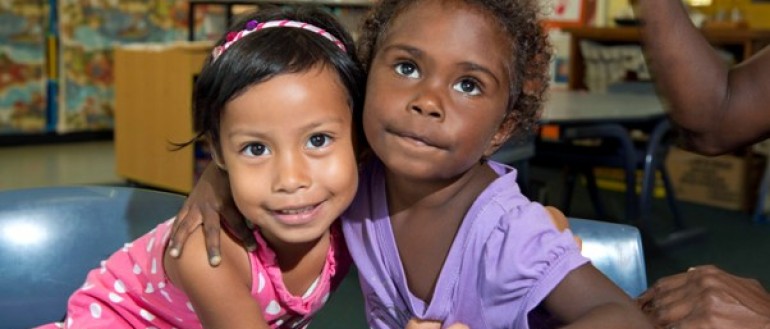Summary:
The ORVAC study – Optimising Rotavirus Vaccine in Aboriginal Children – is a double-blind randomised placebo controlled clinical trial which administers a third (booster) dose of oral rotavirus vaccine to Aboriginal children six to twelve months old, to reduce the burden of gastroenteritis.
Despite the introduction of rotavirus vaccine into the Northern Territory Immunisation Schedule in 2006, the rate of severe rotavirus gastroenteritis for Northern Territory Aboriginal children remains much higher than for other Australian children, with a large residual burden of rotavirus disease in the second and third year of life.
Epidemics of rotavirus continue to occur in remote central and northern Australia and place enormous strains on remote communities, clinics and aero-medical and hospital services.
Objectives:
Oral Rotarix rotavirus vaccine is currently given to infants in a two-dose schedule at age six weeks and 4 months old.
The ORVAC study is a novel two-stage Bayesian adaptive randomised controlled clinical trial to determine the effect of scheduling a third (booster) dose of rotavirus vaccine for Aboriginal children aged 6 to < 12 months on immunological and clinical outcomes.
ORVAC Stage 1 recently enrolled 250 Aboriginal and Torres Strait Islander children from the Northern Territory and demonstrated that their anti-rotavirus IgA sero-response (titre >20 AU/ml) increased from 65% to 85% among children who received an additional vaccine dose; children who received placebo had no increase in their sero-response (from 74% to 72%).
Evidence is now needed that this improved immune response translates into meaningful clinical protection against rotavirus gastroenteritis.
ORVAC Stage 2 is now enrolling up to 750 additional infants to determine if the third (booster) dose of rotavirus vaccine leads to improved protection against medical presentations for acute gastroenteritis or diarrhoea in the first three years of life.
Implications for policy and practice:
There is a strong need to find effective and practical strategies to improve the effectiveness of rotavirus vaccines for Australian Aboriginal and Torres Strait Islander children. We hope to show that a third (booster) dose of rotavirus vaccine after six months old could meet this need.
Chief Investigator:
- Professor Tom Snelling (University of Sydney)
- Dr Bianca Middleton
Project Manager:
- Sarah Gallagher - email
Key dates:
The project commenced in 2018 and is due for completion in 2027.
- Middleton, B.F., Jones, M.A., Waddington, C.S., Danchin, M., McCallum, C., Gallagher, S., ... & Snelling, T. (2019). The ORVAC trial protocol: a phase IV, double-blind, randomised, placebo-controlled clinical trial of a third scheduled dose of Rotarix rotavirus vaccine in Australian Indigenous infants to improve protection against gastroenteritis. BMJ Open, 9(11), e032549 https://bmjopen.bmj.com/content/9/11/e032549.abstract
- Jones, M. A., Graves, T., Middleton, B., Totterdell, J., Snelling, T. L., & Marsh, J. A. (2020). The ORVAC trial: a phase IV, double-blind, randomised, placebo-controlled clinical trial of a third scheduled dose of Rotarix rotavirus vaccine in Australian Indigenous infants to improve protection against gastroenteritis: a statistical analysis plan. Trials, 21(1), 1-19. https://trialsjournal.biomedcentral.com/articles/10.1186/s13063-020-04602-w
- Middleton, B. F., Danchin, M., Jones, M. A., Leach, A. J., Cunliffe, N., Kirkwood, C. D., ... & Snelling, T. L. (2022). Immunogenicity of a Third Scheduled Dose of Rotarix in Australian Indigenous Infants: A Phase IV, Double-blind, Randomized, Placebo-Controlled Clinical Trial. The Journal of Infectious Diseases, 20, 1-8. https://ris.cdu.edu.au/ws/files/56002370/jiac038.pdf
Funders:
Collaborators:
- Wesfarmers Centre for Vaccines and Infectious Diseases, Telethon Kids Institute, Perth, WA
- Health and Clinical Analytics, School of Public Health, University of Sydney, NSW
- Murdoch Children’s Research Institute, Parkville, Victoria

